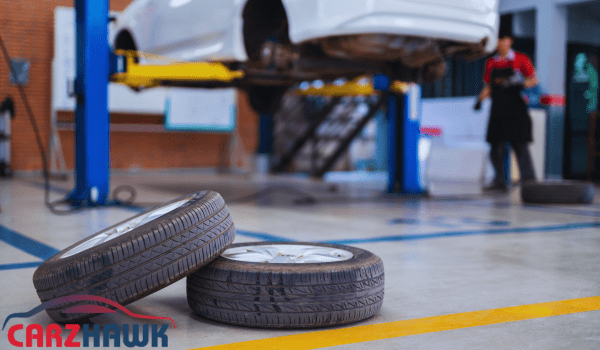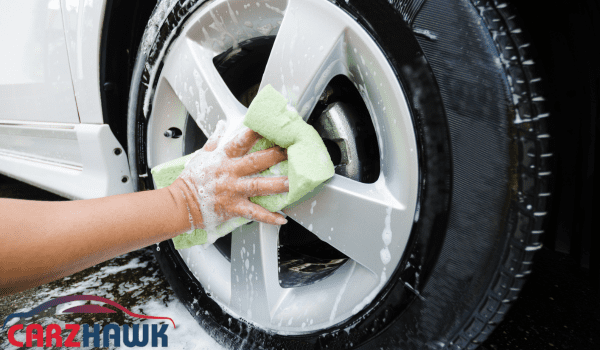The tubes at Costco’s tire center might be bright green instead of black the next time you go there. Costco use nitrogen to fill tires instead of regular air.
Costco and other supporters say that nitrogen has some benefits. What are these perks, though? Are there any problems? How much does it cost?
Find out why Costco use nitrogen to fill tires by reading on.
Gas Nitrogen
Nitrogen is a gas that makes up almost 80% of the air we breathe. It is neutral, not flammable, and has no smell. Many manufacturing and business processes use Gas, such as storing and packaging food. Nitrogen helps stabilize pressure levels better than regular compress air because it is stable and doesn’t respond to anything else.
For years, nitrogen has been used to fill up the tires of airplanes and race cars to keep the pressure stable when the temperature changes. Nitric oxide is also employed in racing because it has less water than regular air. Over time, water vapor can rust wheel parts and change the pressure when it condenses at low temperatures.
Over the past few years, nitrogen inflation has spread to passenger cars. One big store that offers this service is Costco, which says it’s suitable for regular passenger cars.
It does sound appealing, but how helpful is it for the average car or truck? Let us look at why Costco use nitrogen to fill tires.
Why Does Costco Use Nitrogen in Tires?
Costco says that using pure nitrogen to inflate tires instead of normal compressed air has some significant benefits:
1: Keeps the Right Amount Of Inflation Pressure
Because nitrogen molecules are more significant than oxygen molecules, nitrogen is less likely to leak out of tires over time. This helps the tires stay at the pressures suggested by the car’s maker for longer without inflating again. This level of tire pressure stability can help your car handle better, making your trips more pleasant (and fun).
2: It Slows Down Tire Wear
Oxidation is the process that can speed up the age of wheels and tires from the inside. Air contains moisture. When steel belts and other parts are exposed to air and water, they rust faster. Nitrogen is dry and doesn’t do anything, so it slows down the breakdown inside tires.
3: Possible Cost Savings on Gas
When tires are underinflated, they have more rolling resistance with the road, which makes the gas economy worse. Nitrogen tires may use less gas than air-filled tires because they keep the pressure better between fill-ups. Estimates of how much fuel could be saved vary a lot, though.
4: Makes Things Safer
It is safer to drive on tires that are correctly filled. Nitrogen is better than air at keeping pressures at the right amount, which makes traction, stopping, and handling more consistent. W worn-out and poorly inflated tires are more likely to blow out and slide around in the rain.
5: Less Often Topping Up
Because nitrogen tends to stabilize pressure, you won’t have to check and change your tire pressure as often, making your maintenance routine easier.
However, even though the reasoning has been given, there are still doubts about how significant the benefits are for most drivers. Let’s look into it more.
Looking at the Pros of Tires Filled with Nitrogen
Studies examining how much nitrogen is good for you show a mixed picture. Even though nitrogen inflation could help, it’s still hard to say how much it will save on fuel economy, tread life, and safety.
Possible Savings on Fuel
A U.S. Department of Energy study showed that keeping tires inflated with nitrogen instead of air statistically affected fuel economy. Still, the savings were only about 1% to 2%. That’s less than one extra mile per gallon for a car that gets 25 mpg on average. Other tests done by outside groups have found almost the same results regarding how well the cars use gas.
Lifespan of Tires
Keeping the correct tire pressure does help stop problems with uneven tread wear. However, estimates of how much longer nitrogen-filled tires last than fully inflated air-filled tires range from 0% to 10-15%. A lot depends on how people drive and how the roads are.
Peace of Mind
Everyone agrees that proper inflation makes it easier to control and stop. However, there isn’t a lot of solid evidence to show that nitrogen alone makes everyday drivers in passenger cars safer in a big way. People who drive race cars might see things differently.
Drivers must also be serious about maintaining their nitrogen tires for the best results. They must pay attention to slow leaks, keep the recommended pressure levels, and refill them regularly. Without that commitment, the advantages go away very quickly.
Cons of Filling Up Your Tires with Nitrogen at Costco
It’s not clear what the benefits of nitrogen tire filling might be, but there are also some problems to think about:
1: Limits on Availability
There are fewer places to replace nitrogen than there are air pumps. Costco tries to fix this by having tire shops in many areas, but you must plan ahead and sometimes wait a long time. For customers far from a store with nitrogen, it’s no longer helpful.
2: Leaks Without Any Notice
It’s not easier to find leaks in nitrogen than in compressed air. If you blow out your tire because of a screw, it won’t hiss to let you know. You still need a tire pressure measure to ensure you don’t accidentally under-inflate your tires.
3: Time
However, getting nitrogen-filled tires at Costco may take longer than you’d like. Costco’s tire shops are known to be busy, so you may have to wait for help, especially on busy days or times. If you’re on a tight plan, this wait time could be a big bother. Your local Costco has a self-service tire inflation machine, so you will be one of many who need it.
Also, unless you’re already going to Costco for household items, the time it takes to drive there can add to the overall time loss. This is especially true if tire shops don’t offer nitrogen filling nearby, making the extra drive to Costco seem like a waste of time.
4: Higher Costs Upfront
Retailers must pay more to install nitrogen inflation equipment than air compressor stations. Some of that money spent on equipment could mean customers must pay more for services. They pay for it as a perk of being a member, which you pay for by paying for the membership every year.
Putting the Pros and Cons together
On the one hand, nitrogen tire inflation has benefits based on science. For example, when tires are properly inflated, they keep their air longer, internal corrosion is lessened, and fuel economy is improved. On paper, it makes sense.
However, there still needs to be more consistent real-world statistics. The unpleasant truth is that most regular drivers may save little or no money compared to adequately inflated air tires.
However, Costco members can use the service for free, so trying nitrogen with no risk makes sense. Remember that the main benefits come from consistently maintaining proper tire pressure, not from any magical properties of nitrogen itself.
So, if you choose nitrogen, you should be ready to keep up with regular tracking and inflation scheduling. Otherwise, any possible improvements will go away with the nitrogen gas.







